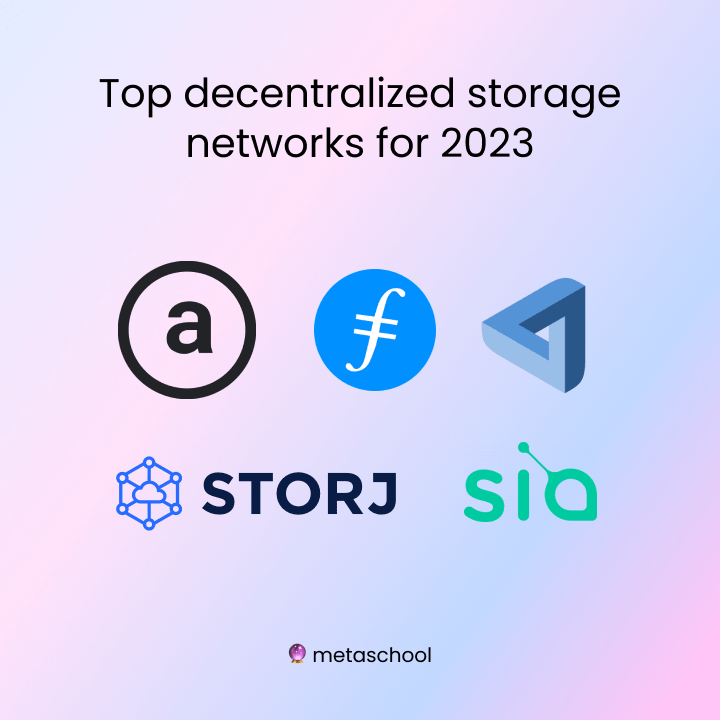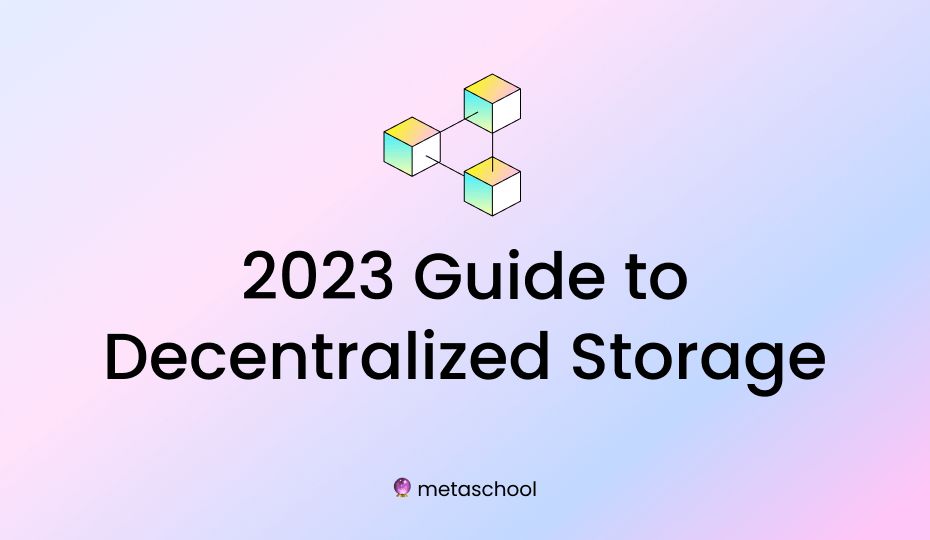Table of Contents
Decentralized storage refers to a network of distributed computer systems that are used to store data in a distributed manner, rather than relying on a single, centralized data store.
This can be contrasted with traditional, centralized storage systems, which rely on a single server or group of servers to store and manage data.
Decentralized storage systems use a distributed network of computers, each of which stores a portion of the data. This data is often split into smaller chunks, known as “blocks,” and each block is stored on a different computer in the network.
The blocks are then replicated and stored on multiple computers, ensuring that the data is safe and can be accessed even if some of the computers in the network fail.
How decentralized storage works, step-by-step 🖇
- A user uploads their data to a decentralized storage network
- The data is encrypted and divided into small pieces, known as shards
- The shards are distributed across multiple nodes, which are typically run by different individuals or organizations
- The nodes are incentivized to participate in the network through rewards or other incentives
- When a user wants to access their data, they can do so through a decentralized application (dApp) that connects to the network and retrieves the shards from the nodes that are storing them
- The shards are decrypted and reassembled to provide the user with access to the data
- The decentralized storage network uses a consensus mechanism, such as proof-of-work or proof-of-stake, to ensure the integrity of the network and prevent data loss or tampering
- The network is governed by a set of rules or protocols, which are agreed upon by the participating nodes and are enforced through the use of smart contracts or other mechanisms
There are several different technologies that can be used to implement decentralized storage, including distributed hash tables (DHTs) and blockchain-based systems. The specific technology used will depend on the requirements of the application and the goals of the system.
Characteristics and benefits of using decentralized storage ⚡️
Decentralized storage systems offer several benefits over traditional centralized storage systems, including improved security, increased reliability, and reduced reliance on a single point of failure. Here’s a detailed look at their characteristics.
1. Enhanced security
Decentralized storage systems are more secure than centralized ones because data is stored across multiple physical locations and devices. This means that if one node is compromised, the other nodes will still have the data intact and secure. As a result, decentralized storage networks are less vulnerable to hacks or data breaches.
2. Improved data availability
Decentralized storage networks are more reliable than centralized ones because they are distributed across multiple nodes. This means that if one node goes down, the other nodes will still have the data available. This ensures that the data is always available and accessible, even in the event of a disaster.
3. Lower costs
Decentralized storage systems are typically much more cost-effective than centralized ones because they don’t require expensive hardware or software. They also don’t require expensive maintenance and upkeep. As a result, users can save money by using decentralized storage networks.
4. Increased scalability
Decentralized storage networks are much more scalable than centralized ones. This means that users can easily add new nodes to their network as their storage needs grow. This makes them ideal for applications that require large amounts of storage capacity.
5. Increased privacy
Decentralized storage networks provide increased privacy because data is stored across multiple nodes. This means that users can be sure that their data is not being monitored or accessed by third parties. This makes them ideal for applications that require a high level of privacy.
Important factors to consider when deciding on dStorage or decentralized storage options
⚡️ Persistence mechanism/incentive structure
You must choose a dStorage option that has a well-defined persistence mechanism, such as proof-of-work, to ensure that nodes are incentivized to continue participating in the network and storing data.
⚡️ Data retention enforcement
It is crucial to choose a storage option that has mechanisms in place to enforce data retention, such as penalties for nodes that fail to store data or rewards for nodes that store data for a certain amount of time.
⚡️Decentrality
At its core, your option must be decentralized, with data distributed across multiple nodes, to reduce the risk of data loss or compromise.
⚡️ Consensus
Choose a dStorage option that uses a robust consensus mechanism, such as proof-of-stake or proof-of-work, to ensure that the network is secure and reliable.
Most popular decentralized storage networks for 2023
These decentralized storage networks are important as they offer users alternative storage solutions that are secure, reliable, and cost-effective. They also provide users with greater control over their data, as they are not required to trust a single entity with their data.

Let’s take a deeper look at them and why they’re at the top.
1. Filecoin
Filecoin is a decentralized storage network that uses a proof-of-replication and proof-of-spacetime consensus mechanism to incentivize nodes to store data. Some of the characteristics that make Filecoin a robust decentralized storage network include:
Robust security measures: uses encryption to protect data, and the data is distributed across multiple nodes, making it difficult for hackers to compromise.
High-performance capabilities: has been designed to provide users with fast access to data, with the ability to retrieve data from multiple nodes simultaneously.
Flexible storage options: allows users to choose from a range of storage options, including long-term, short-term, and low-cost storage options.
Incentive structure: uses a proof-of-replication and proof-of-spacetime consensus mechanism to incentivize nodes to store data, providing a strong incentive for nodes to continue participating in the network.
Scalability: has been designed to be scalable, with the ability to accommodate a large number of users and a large amount of data.
Governance structure: governed by a decentralized autonomous organization (DAO), which allows users to participate in decision-making and helps ensure the integrity of the network.
2. Sia
Sia takes help from its proof-of-work consensus mechanism to incentivize nodes to store data. It is popular due to its low cost and ability to provide users with complete control over their data. There are several characteristics of Sia that make it a robust decentralized storage network, including:
High security: uses encryption and other security measures to protect data from unauthorized access.
Reliability: uses a proof-of-work consensus mechanism to ensure the integrity of the network and prevent data loss or tampering.
Low cost: provides users with low-cost storage options, as nodes are incentivized to participate in the network through rewards.
User control: gives users complete control over their data, as they are not required to trust a single entity with their data.
Scalability: it’s designed to be scalable, allowing the network to handle a large volume of data.
Interoperability: it is compatible with other decentralized applications, allowing for seamless integration and interoperability.
3. Storj
Storj is a decentralized storage network that uses a proof-of-retrievability consensus mechanism to incentivize nodes to store data. Some characteristics of Storj that make it a robust decentralized storage network include:
High-speed performance: makes use of advanced technology, such as erasure coding and sharding, to provide users with fast access to data.
Privacy-focused storage solutions: it uses encryption and distributed storage to provide users with secure and private data storage solutions.
Flexible pricing: offers flexible pricing options, allowing users to choose the storage and bandwidth options that best meet their needs.
Scalability: it is highly scalable, with the ability to support large amounts of data and a growing user base.
Robust security measures: uses multiple layers of security, including encryption and distributed storage, to protect data from unauthorized access.
User-friendly interface: provides users with an easy-to-use interface, allowing them to easily upload and manage their data on the network.
4. Arweave
Arweave uses a proof-of-access consensus mechanism to incentivize nodes to store data. It is popular due to its ability to provide users with long-term storage solutions, as well as its low cost and high scalability.
Proof-of-access consensus mechanism: this incentivizes nodes to store data for long periods of time by rewarding them for providing access to the data. This ensures that data is retained on the network for the long term.
Low cost: uses a novel approach to data storage that allows it to provide users with low-cost storage solutions. This makes it an attractive option for users who are looking to store large amounts of data without incurring high costs.
High scalability: is built on a scalable architecture that allows it to support a large number of users and transactions. This makes it well-suited for applications that require high-speed data access and storage.
Long-term storage solutions: it’s designed to provide users with long-term storage solutions, allowing them to store data on the network for extended periods of time. This makes it an ideal option for applications that require long-term data retention, such as archival or historical data.
Privacy-focused: it provides users with privacy-focused storage solutions, allowing them to store data on the network without revealing their identity. This makes it an attractive option for users who value their privacy and want to ensure that their data is secure and private.
5. MaidSafe
MaidSafe offers a proof-of-resource consensus mechanism to incentivize nodes to store data. It is popular due to its ability to provide users with secure and private data storage solutions. Some of the characteristics of MaidSafe that make it a great and recommended decentralized storage network include:
Security: it uses advanced encryption techniques to protect data, and the data is distributed across multiple nodes, making it difficult for hackers to compromise.
Reliability: has a proven track record of uptime and reliability, ensuring that data is always accessible.
Privacy: provides users with privacy-focused storage solutions, allowing them to control who has access to their data.
Cost-effectiveness: offers competitive pricing for storage and data access, making it a cost-effective alternative to traditional centralized storage solutions.
Scalability: highly scalable, with the ability to support a large number of users and data storage needs.
Governance: it indeed is decentralized and self-governed, with nodes participating in the network through a proof-of-resource consensus mechanism. This ensures that the network is secure and reliable.
That’s all the updated info we have for you on decentralized storage. They’re secure, reliable and scalable.
Found this helpful? Share it, fren 🤙🏼
